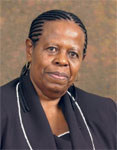
Top stories






More news

Marketing & Media
Warner Bros. was “nice to have” but not at any price, says Netflix

Logistics & Transport
Maersk reroutes sailings around Africa amid Red Sea constraints

















The dialogue was convened under the theme: Working together towards women empowerment and gender equality.
During the dialogue, Mabudafhasi highlighted the role women played during the apartheid days in the management of the country's natural resources. "During the apartheid years and still today, due to the migrant system, while men went to work on the mines and in the cities, it was left mainly to women... to look after the crops and cattle in the rural areas," she said.
The Department of Environmental Affairs is planning to create the equivalent of more than 34,000 full-time jobs during the 2013/14 financial year through its Environmental Protection and Infrastructure, and Natural Resource Management Programmes. At least 55% of these employment opportunities will be afforded to women and the youth. The department will provide training to the beneficiaries adding up to a target of 184,000 days.
Currently, the Department of Environmental Affairs runs Environmental Sector Public Works Expanded Programmes such as Working for Water, Working on Fire, Working for Wetlands and so forth. The main objective of these programmes is to ensure efficient and sustainable management of South Africa's natural resources. These programmes play a crucial role in protection of the environment and creation of job opportunities particularly for women and persons with disability.
Departments of Environment and Water Affairs have invested over R7.5-billion on the Working for Water Programme, which aims to control and contain the invasive alien plants. Since its inception in 1995, the programme has created the equivalent of more than 174,000 years of employment, and created employment opportunities to an average of 26,000 people per year, with 54% of them being women. The programme has treated more than 2-million hectares of invasive alien plants, thereby reducing risks of land degradation and desertification. Furthermore, through this programme, the department plans to produce 19,000 school desks supporting other sister departments in government.
Mabudafhasi told the attendees that when it comes to improving the natural resources, government did not only promise, but has delivered: "If it was not for this investment and the introduction of biological control, South Africa's biodiversity and, to some extent, food security could have been under major threat," she said.
Furthermore, the departments have invested more than R2.2-billion in the Working on Fire Programme. The programme supports land users to contain more than 9,700 wild fires over an estimated area of more than 4.6-million hectares in order to secure life and livelihoods. Most of the beneficiaries of this are women and persons with disability as well.
In addition, the departments invested more than R560 million in the Working Wetlands Programme for the restoration and protection of wetlands since its inception in 2005.
Go to www.environment.gov.za to access the deputy minister's speech.